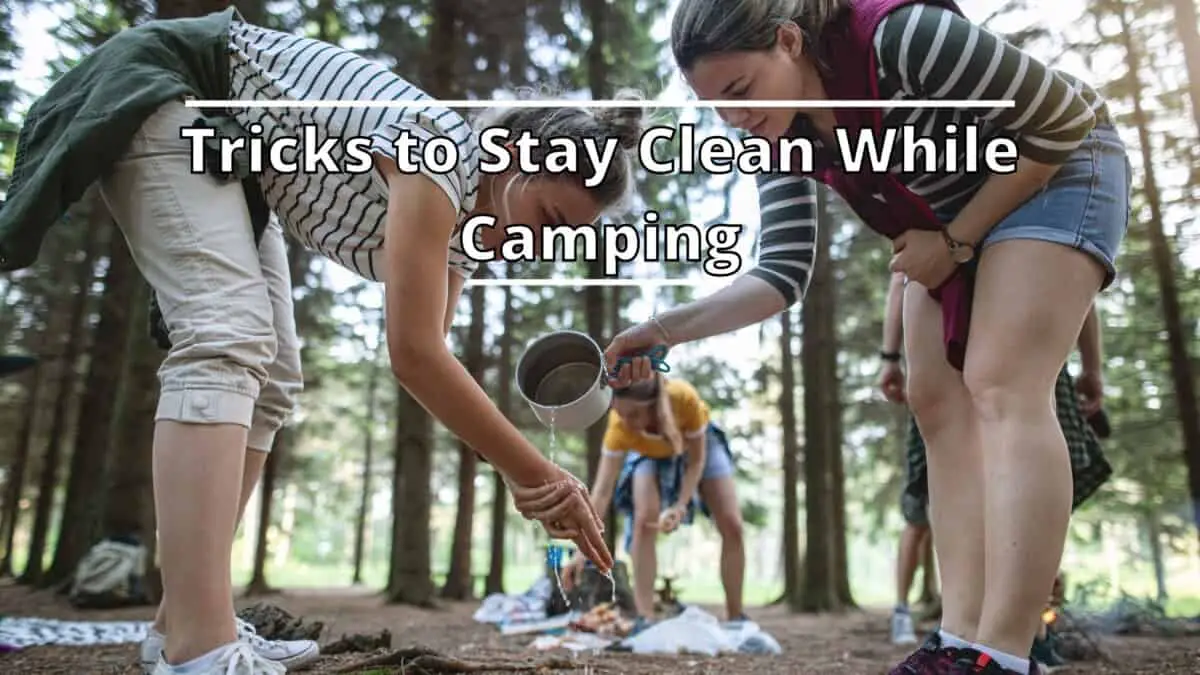Not all places are near lakes and rivers. There are instances where you expect there to be water supplies, but there actually is none. This situation is extremely hard if you plan to camp in that specific place.
With such, you can still camp without taking a shower. You can use dry shampoo, hand sanitizer, alcohol, baby wipes, and no-rinse soap. Another tip to maintain cleanliness is to wear clean clothes, bring extra outfits, use sweatproof shirts, and sleeping bag liners.
We still have a lot of things and tips to discuss in this article. Starting with the methods to maintain proper hygiene, factors to preserve cleanliness, and techniques on how to camp without water.
Staying clean is an important aspect of camping. Just because we’re away from bathrooms and running water does not mean that we have to stay filthy. If you can, we recommend that you use camping showers. We tested numerous products and we came up with a list of the best camping showers available in the market today.
Tricks to stay clean while camping, even without a shower
To maintain proper hygiene without taking a shower, you can use the previously mentioned tools. By using these essentials, you won’t be using water, but will still be able to clean yourself up. We also suggest going to the nearest lakes or rivers for water supply.
We recommend the following methods.
1. Use dry shampoo
To maintain proper hygiene without taking a shower, using dry shampoo is a great choice. You won’t be needing any water to use this.
Even if you bring water with you, using this substance prevents you from using water, and preserve it for more important purposes.
2. Use hand sanitizer or alcohol
Before eating or cooking, we advise you to properly clean your hands. Be careful, and don’t just be complacent that you haven’t touched anything and rubbed your hands on your outfit, as it can result in illnesses that you may not expect.
Your adventure could lead to a disaster, instead of enjoyment. Without the use of water, hand sanitizer and alcohol can help you clean your hands. This is also favorable to water conservation.
3. Baby wipes
Another alternative after you use the bathroom is to use wipes on the intended parts. Again, you can save more water just by using baby wipes. It will allow you to clean up, without fully washing.
Aside from baby wipes, there are also wet wipes that are sold on the market, which you can use for any purpose or occasion. It is a great way to sustain cleanliness if you can’t shower.
4. No-rinse soap or biodegradable soap
If dry shampoo exists, so does no-rinse soap. You can use this without rinsing water, if you don’t plan to take a shower. Replacing your regular soap with this is also a good decision.
On the other hand, we also prefer to use biodegradable soap to avoid harming the environment. However, you will need water to rinse the suds.
5. Shower in rivers or lakes
Not taking a shower is one of the main reasons to conserve water. But if there is a nearby lake, river, or any water supply, then take this chance to shower, clean up, or fill up your water tanks. Most people can’t bear not taking a shower for a long time, so if there is only one opportunity to do so, grab it to freshen up.
Taking a shower is still the best way to clean yourself and freshen up. When you’re camping, you don’t have the luxury of unlimited water supply. Still, this does not mean that you can’t have a proper shower. Read our article to learn how to shower while camping.
Factors to consider when maintaining cleanliness
Aside from observing proper hygiene, you should also preserve the cleanliness of the things you are using. You can start off by constantly using clean clothes and undergarments, bringing extra outfits, wearing a sweatproof shirt, and bringing a sleeping bag liner. Practicing these can help keep freshness in your surroundings.
1. Bring extra outfits
This is applicable if you are going out for more than a day. To preserve cleanliness and freshness, you need to change your clothes or outfits. At night, we recommend you to wash the outfit you wore during the day, so that it can dry while you are sleeping. This does not only apply to outfits, but also to your undergarments, like socks and underwear.
For underwear, use one underwear per day; and for socks, if you are camping for four days, you can bring two pairs. When packing, consider the place you are camping in. If it has wet weather conditions, then we suggest you bring extra socks.
2. Wear a sweatproof outfit
You’ll never guess the temperature of a certain place. So, it is better to wear a sweatproof outfit. If it is too hot, we tend to sweat a lot, and that will push us to change in no time. The amount of extra outfits you packed may not be appropriate for the days of your estimation if you do happen to sweat a lot.
To avoid this, if possible, wear one of this type of shirts, and also pack the same fabric for an outfit.
3. Use a sleeping bag liner
These work as bed sheets for your camping beds. It will cover the surface of the bed to preserve cleanliness. There are times that beds form a smell and dirt if used for a long time. With the use of a liner, you can prevent this drawback from happening, and you can just clean and wash the liner if it has dirt on it, instead of washing the whole camping bed. Bring extra sleeping bag liners if possible.
4. Wear clean clothes and undergarments
This is a clear idea for everyone; a person wouldn’t go camping in the clothes they wore the previous day, right? Just like we suggested, bring extras to allow you to wash your dirty clothes. And at the start of your camping activity, it is really recommended to use clean clothes.
That can help your freshness last longer than with already-worn clothes. It is obvious that you will find it very unhygienic to wear dirty clothes. That’s just gross.
If you’re the kind of person who can’t survive a day without showering, camping will be a very challenging activity for you. If you’re really determined to wash up with running water after a long day in the great outdoors, you must know these ideal places to take a shower when on the road.
Techniques to clean yourself when camping without water supply
There are cases in which a camper does not have any water supply, so it is best to carry water with you every time. To wash your utensils with running water, you can sterilize them. Lastly, be cautious and look for water, as your stock won’t last forever.
We recommend you the following techniques.
Bring water, or fill your water tank
We undoubtedly think that packing water in your vehicle is the best way to avoid scarcity. There are places where there is no water supply, which is very difficult for a camper, especially if they expected to find some. Whether there is water supply or not, we suggest you bring water with you.
Fill your water tank if you take it with you in your vehicle.
Wash your utensils
As we’re talking about not using water or conserving it, we advise you to bring your own water. That is if there is no nearby water supply around you. Soak, or wipe your utensils before washing them, and use baking soda. You can also spray vinegar or sterilize them.
Placing them under sunlight can also kill the bacteria after cleaning them.
Look for water
If the water you brought is only enough to last for a day, then it is not advisable to stay in one place for a long time. That will leave you stinky and thirsty, and it is dangerous. Always check if your water storage can still cover you up, and be ready to move to a new location where you can find water. No matter what happens, you will really be needing water.
Conclusion
You can withstand a couple of days without taking a shower when camping by following the tips we enumerated above. However, if you are a person who feels uncomfortable not to shower for a day, then maybe one day is too much for you.
This article is solely for campers who might be experiencing insufficient water supply, which is very difficult. Even if you think you will not experience this, you should be informed about these methods to prepare yourself, just in case.
Just a reminder that you are not in your house when camping, so everything is limited and unexpected. Be vigilant.

